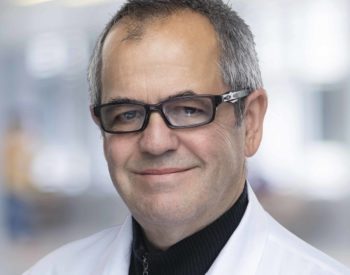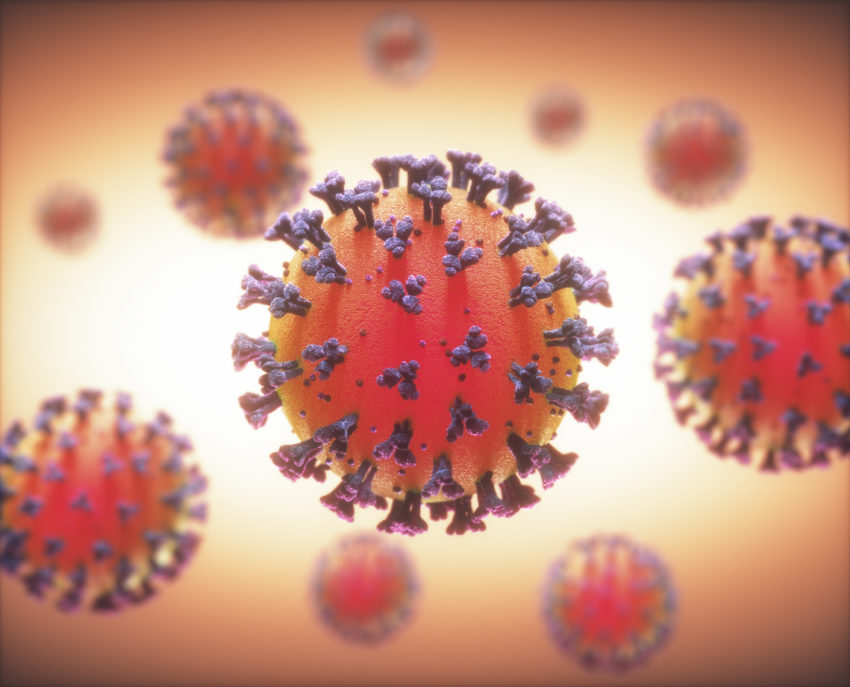SAN ANTONIO (May 1, 2020) — The FDA on May 1 gave emergency authorization to a new anti-viral drug to treat patients with COVID-19. The announcement was made during an afternoon news conference by President Trump. It comes two days after the National Institute of Allergy and Infectious Diseases (NIAID) released preliminary results of a national clinical trial showing that the new drug, remdesivir, is helping the sickest COVID-19 patients recover more quickly and is preventing deaths.
 Thomas Patterson, M.D., professor and chief of the Division of Infectious Diseases in the Long School of Medicine at UT Health San Antonio, is principal investigator of a study site collaborating with University Hospital, where he is leading the COVID-19 Infectious Disease team. The trial is sponsored by the NIAID and is being conducted at more than 75 sites in the U.S. and a few foreign locations, each under local principal investigators.
Thomas Patterson, M.D., professor and chief of the Division of Infectious Diseases in the Long School of Medicine at UT Health San Antonio, is principal investigator of a study site collaborating with University Hospital, where he is leading the COVID-19 Infectious Disease team. The trial is sponsored by the NIAID and is being conducted at more than 75 sites in the U.S. and a few foreign locations, each under local principal investigators.
“It’s very exciting to be involved in a clinical trial that is moving forward so quickly toward helping patients,” Dr. Patterson said. “This is the first anti-viral drug that has been shown to benefit patients with COVID-19 in a randomized clinical trial.”
With FDA emergency authorization, all hospitalized COVID-19 patients meeting criteria for use can receive remdesivir, which is now the standard of care. The clinical trial will move into what is called the adaptive phase. This means that all hospitalized COVID-19 patients who qualify and consent to the study will be given the new drug. They will be randomly assigned to receive additional agents that researchers hope will further improve outcomes. Dr. Patterson said that as other agents are developed, they will be added to remdesivir and evaluated in comparison to remdesivir alone. “We expect to begin the adaptive phase next week,” Dr. Patterson said.
“Remdesivir is not a cure, but it has shown a lot of promise. It has improved recovery time by 31% from 15 to 11 days and improved the death rate from 11.6% to 8%. But 8% mortality is still a lot of people, so the use of additional agents is aimed at further improving outcomes,” he said. The drug acts by disrupting the coronavirus replication process.
“Other new drugs that are being developed might address other processes involved in the illness, like attacking what we call ‘inflammatory storm.’ This is when the body reacts so strongly against the invading virus that it attacks other areas of the body causing, for example, respiratory failure and failure of other organs,” Dr. Patterson said.
So far 20 patients at University Hospital have received remdesivir, Dr. Patterson said.
The international study began Feb. 21 in Nebraska in patients who were quarantined following their return to the U.S. from China. The UT Health San Antonio study site began enrolling University Hospital patients March 26. According to the preliminary findings, overall, 1,063 patients were involved in the study. Approximately half of the patients received remdesivir in an infusion solution while the other group received a placebo solution, with neither patients nor physicians knowing which solution the patient received.
For additional information, please see the FDA news release,
# # #
The Long School of Medicine at The University of Texas Health Science Center at San Antonio is named for Texas philanthropists Joe R. and Teresa Lozano Long. The school is the largest educator of physicians in South Texas, many of whom remain in San Antonio and the region to practice medicine. The school teaches more than 900 students and trains 800 residents each year. As a beacon of multicultural sensitivity, the school annually exceeds the national medical school average of Hispanic students enrolled. The school’s clinical practice is the largest multidisciplinary medical group in South Texas with 850 physicians in more than 100 specialties. The school has a highly productive research enterprise where world leaders in Alzheimer’s disease, diabetes, cancer, aging, heart disease, kidney disease and many other fields are translating molecular discoveries into new therapies. The Long School of Medicine is home to a National Cancer Institute-designated cancer center known for prolific clinical trials and drug development programs, as well as a world-renowned center for aging and related diseases.
The University of Texas Health Science Center at San Antonio, dba UT Health San Antonio, is one of the country’s leading health sciences universities and is designated as a Hispanic-Serving Institution by the U.S. Department of Education. With missions of teaching, research, patient care and community engagement, its schools of medicine, nursing, dentistry, health professions and graduate biomedical sciences have graduated more than 37,000 alumni who are leading change, advancing their fields and renewing hope for patients and their families throughout South Texas and the world. To learn about the many ways “We make lives better®,” visit www.uthscsa.edu.
Stay connected with The University of Texas Health Science Center at San Antonio on Facebook, Twitter, LinkedIn, Instagram and YouTube.



